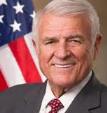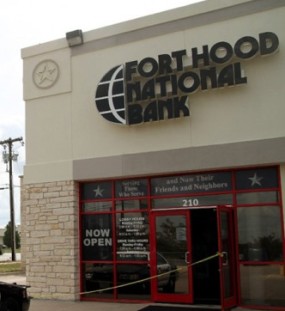 By Ben Barrack
By Ben Barrack
Via the Wall Street Journal:
Fort Hood National Bank lets soldiers overdraw their accounts by hundreds of dollars at its seven branches on the Fort Hood U.S. Army base in Texas. It charges them up to $35 for each overdraft.
Not long after Samantha Smith started her customer-service job at the bank in 2010, she noticed she spent most of her time on soldiers struggling with those fees.
The bank disclosed the fees, she says, but many soldiers didn’t understand it would charge them $35 repeatedly, even for small debit-card transactions. When their Army paychecks arrived, the bank withheld overdrawn sums and fees, often leaving them short of funds and vulnerable to more overdraft charges, she says.
“They could never catch up. It was awful,” says Ms. Smith, who left the bank a year later. “These guys are 18 years old and they never really managed money. The bank knows that.” Fort Hood National officials didn’t respond to inquiries.
There is something inherently wrong with banks taking advantage of those who volunteer to make the ultimate sacrifice in defense of the system that enables said banks to take advantage of those who are willing to sacrifice everything.
According to the Journal, banks may have decided to exploit such distractions:
A Wall Street Journal analysis of bank filings found that Fort Hood National and three other banks that have on-base branches were among the top 10 U.S. banks in terms of service-charge income as a percentage of deposits in the 12 months ended Sept. 30.
Officials at the U.S. Army, which runs many of the bases at which these banks operate, say they aren’t aware of any issues with overdraft fees at those banks or in its wider banking program.
Among the other six banks in the top 10 in the Journal analysis of almost 7,000 banks with more than $5 million in deposits, three have head offices near major military bases and share ownership with at least one of the four on-base banks flagged as having high fees.
At first blush, these banks lack compassion and perspective.
 The district of Rep. John Carter (R-Round Rock) includes Fort Hood and this story provides a huge opportunity for Rep. Carter to call out these banks.
The district of Rep. John Carter (R-Round Rock) includes Fort Hood and this story provides a huge opportunity for Rep. Carter to call out these banks.
After a natural disaster, are people willing to pay anything for potable water? Yes. Does that mean those with the water should demand an exorbitant price simply because they can enrich themselves by doing so? No.
If such a natural disaster included large scale casualties that required blood donors, would people give willingly, without an expectation for repayment?
Yes.
What’s the difference between the banks and the blood donors?
Perspective. Whilst money is the lifeblood of banks, the lifeblood of soldiers who use those banks is… well, blood. Blood they are willing to shed for those bank managers.
Y’all’ve heard of predatory lending, right? When it comes to soldiers, whose top priority is staying alive halfway around the world while doing all they can to hold things together at home, compassion and assistance should be the top priority of the leadership in their banks.
In the military, morale can be the difference between life and death; it’s a delicate balance. What does debt do to morale?
The Pentagon considers debts incurred by military members to be a significant morale and readiness issue.
In World War II, the American people joined together for a shared purpose. They instinctively knew that if the country was going to remain free, everyone would have to pitch in, do their part, and have each other’s backs.
The victims of the November 5, 2009 Jihadist attack are still refused purple hearts and benefits afforded to casualties of war because Nidal Malik Hasan’s actions weren’t deemed to be an act of war.
Perhaps if bank leaders were to focus less on gouging soldiers and more on standing up for them, the United States would be just a bit closer to restoring that World War II culture.
Ben Barrack is the author of Unsung Davids and co-author of The Case FOR Islamophobia. He writes frequently for Shoebat.com, is a radio talk show host on 1400 KTEM and executive producer of the Lynn Woolley Show.
























